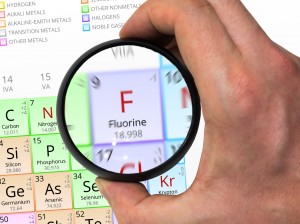You see the term “fluoride” on every tube of toothpaste, dental commercial, and mouthwash bottle. But what exactly is fluoride and what does it do for your mouth? Well, let’s explore fluoride as well as how you can get more of it!
What is Fluoride?
Fluoride is a naturally occurring mineral that is found in water, soil, and foods at different levels of concentrations. This mineral compound helps to prevent tooth decay by making it more resistant to acid attacks from bacteria living in the plaque on your teeth. Fluoride also helps to promote remineralizations, which aids in repairing early decay before cavities form in your teeth.
How Do You Get Fluoride?
There a two ways your teeth can get the fluoride they need to be healthy at home: topical and systemic. The first way is ongoing topical treatment. Topical fluorides are applied directly to your teeth through your dental hygiene routine. Fluoride is in your toothpaste and mouthwash. If you brush you have a good dental hygiene routine, your teeth should not have to worry about fluoride. These are not things you should swallow because of the strength of fluoride. Another way to get the mineral is systemic fluoride treatments. Systemic fluorides can be swallowed in either fluoride treated water or dietary fluoride supplements. These two treatments can be used together in order to prevent cavities.
Professional Treatments Explained
The final treatment option is a professional treatment from your Catonsville Dental Care dentist. Professional treatments can come in four different forms including a varnish, gel, solution, and foam. This treatment takes only a few minutes and is typically applied with a cotton swab, brush, or used as a rinse. It can also be placed into a whitening tray over the teeth where it is held into place for several minutes. After these professional treatments, you will not be able to rinse, eat, or drink anything for at least 30 minutes following your appointment. This will give your teeth enough time to absorb the fluoride and to help repair the microscopic carious areas in your teeth. Depending on your oral health, you may have to get fluoride treatments every three, six, or 12 months.
Do I need a Professional Fluoride Treatment?
There are several things your Catonsville Dental Care dentist will look for in your mouth as well as ask you about your life in order to determine the need for fluoride treatments. As for your dental care, your dentist will examine you for evidence of poor oral hygiene, active cavities, orthodontic treatments, exposed root surfaces, high levels of bacteria, existing fillings, and enamel defects. Your dentist will also ask you about your dental hygiene routine, eating disorders, drug or alcohol abuse, dry mouth or lack of salivation, your diet and drink habits, and any radiation therapy treatments. These conditions and habits might mean you need to have a professional fluoride treatment in order to restore your enamel.
Leikin & Baylin Dental Care of Catonsville
Regularly seeing your Catonsville Dental Care dentist will help to determine if you are in need of a fluoride treatment. For more information on fluoride treatments as well as other preventative dental care services, call Catonsville Dental Care today! Call today at 410-747-1115, or submit any questions by visiting CatonsvilleDentalCare.com.
Disclaimer: The writer of this article is not a medical professional. Information contained herein has been collected from sources believed to be reliable, and every precaution has been taken to ensure its accuracy. The information provided here is for general informational purposes only, and should not be used as a substitute for professional medical care.

